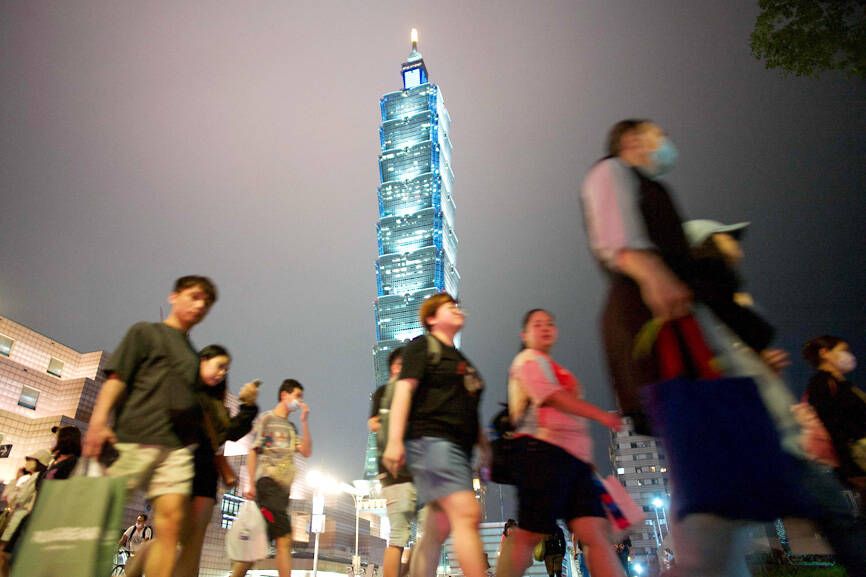Taiwan was the 14th-richest among 193 countries and territories in the world this year, an analysis by Global Finance magazine based on GDP per capita adjusted for purchasing power showed last week.
The world rankings released by the magazine on Thursday last week listed Ireland as the richest country in the world, ahead of Luxembourg in second, with Singapore third, Qatar fourth, Macau fifth, the United Arab Emirates sixth, Switzerland seventh, Norway eighth, the US ninth and San Marino 10th.
Also finishing ahead of Taiwan were Brunei (11th), Hong Kong (12th) and Denmark (13th).

Photo: Sam Yeh, AFP
Among other important economies, Germany ranked 19th, South Korea 30th, the UK 31st, Japan 38th, Russia 60th and China 77th, the report said.
Global Finance said its rankings are based on GDP per capita data from the IMF, which are adjusted to take into account inflation rates, and the cost of local goods and services in each economy.
The resulting figure, known as purchasing power parity, is expressed in international dollars to allow comparisons between different countries, the report said.
Many small countries that hit above their weight economically placed near the top of the rankings, often due to to their sophisticated financial systems, tax programs to attract foreign investment, large stores of hydrocarbons or other natural resources, the report said.
Citing the IMF, the magazine said that some of those figured should be taken with a pinch of salt, as many countries in the rankings, including first-placed Ireland, are tax havens.
This means that the wealth of such countries “was originally generated elsewhere, which artificially inflates their GDP,” and often benefits multinationals far more than the average person, the report said.

CHIP RACE: Three years of overbroad export controls drove foreign competitors to pursue their own AI chips, and ‘cost US taxpayers billions of dollars,’ Nvidia said China has figured out the US strategy for allowing it to buy Nvidia Corp’s H200s and is rejecting the artificial intelligence (AI) chip in favor of domestically developed semiconductors, White House AI adviser David Sacks said, citing news reports. US President Donald Trump on Monday said that he would allow shipments of Nvidia’s H200 chips to China, part of an administration effort backed by Sacks to challenge Chinese tech champions such as Huawei Technologies Co (華為) by bringing US competition to their home market. On Friday, Sacks signaled that he was uncertain about whether that approach would work. “They’re rejecting our chips,” Sacks

NATIONAL SECURITY: Intel’s testing of ACM tools despite US government control ‘highlights egregious gaps in US technology protection policies,’ a former official said Chipmaker Intel Corp has tested chipmaking tools this year from a toolmaker with deep roots in China and two overseas units that were targeted by US sanctions, according to two sources with direct knowledge of the matter. Intel, which fended off calls for its CEO’s resignation from US President Donald Trump in August over his alleged ties to China, got the tools from ACM Research Inc, a Fremont, California-based producer of chipmaking equipment. Two of ACM’s units, based in Shanghai and South Korea, were among a number of firms barred last year from receiving US technology over claims they have

BARRIERS: Gudeng’s chairman said it was unlikely that the US could replicate Taiwan’s science parks in Arizona, given its strict immigration policies and cultural differences Gudeng Precision Industrial Co (家登), which supplies wafer pods to the world’s major semiconductor firms, yesterday said it is in no rush to set up production in the US due to high costs. The company supplies its customers through a warehouse in Arizona jointly operated by TSS Holdings Ltd (德鑫控股), a joint holding of Gudeng and 17 Taiwanese firms in the semiconductor supply chain, including specialty plastic compounds producer Nytex Composites Co (耐特) and automated material handling system supplier Symtek Automation Asia Co (迅得). While the company has long been exploring the feasibility of setting up production in the US to address

OPTION: Uber said it could provide higher pay for batch trips, if incentives for batching is not removed entirely, as the latter would force it to pass on the costs to consumers Uber Technologies Inc yesterday warned that proposed restrictions on batching orders and minimum wages could prompt a NT$20 delivery fee increase in Taiwan, as lower efficiency would drive up costs. Uber CEO Dara Khosrowshahi made the remarks yesterday during his visit to Taiwan. He is on a multileg trip to the region, which includes stops in South Korea and Japan. His visit coincided the release last month of the Ministry of Labor’s draft bill on the delivery sector, which aims to safeguard delivery workers’ rights and improve their welfare. The ministry set the minimum pay for local food delivery drivers at